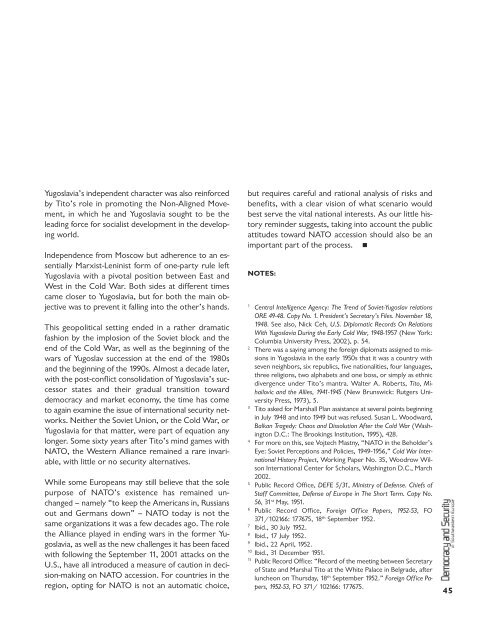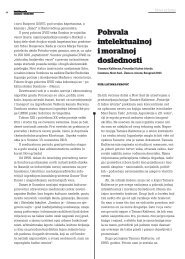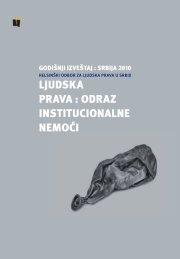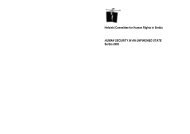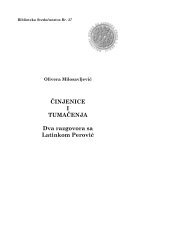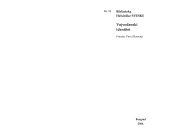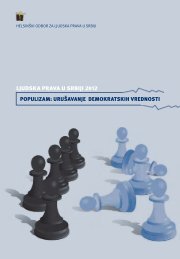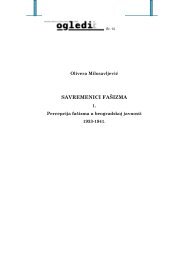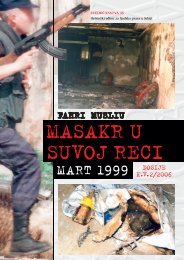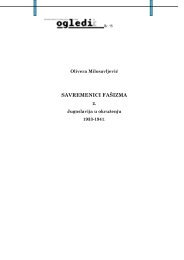DEMOCRACY AND SECURITY in Southeastern Europe, No 1
DEMOCRACY AND SECURITY in Southeastern Europe, No 1
DEMOCRACY AND SECURITY in Southeastern Europe, No 1
Create successful ePaper yourself
Turn your PDF publications into a flip-book with our unique Google optimized e-Paper software.
Yugoslavia’s <strong>in</strong>dependent character was also re<strong>in</strong>forced<br />
by Tito’s role <strong>in</strong> promot<strong>in</strong>g the <strong>No</strong>n-Aligned Movement,<br />
<strong>in</strong> which he and Yugoslavia sought to be the<br />
lead<strong>in</strong>g force for socialist development <strong>in</strong> the develop<strong>in</strong>g<br />
world.<br />
Independence from Moscow but adherence to an essentially<br />
Marxist-Len<strong>in</strong>ist form of one-party rule left<br />
Yugoslavia with a pivotal position between East and<br />
West <strong>in</strong> the Cold War. Both sides at different times<br />
came closer to Yugoslavia, but for both the ma<strong>in</strong> objective<br />
was to prevent it fall<strong>in</strong>g <strong>in</strong>to the other’s hands.<br />
This geopolitical sett<strong>in</strong>g ended <strong>in</strong> a rather dramatic<br />
fashion by the implosion of the Soviet block and the<br />
end of the Cold War, as well as the beg<strong>in</strong>n<strong>in</strong>g of the<br />
wars of Yugoslav succession at the end of the 1980s<br />
and the beg<strong>in</strong>n<strong>in</strong>g of the 1990s. Almost a decade later,<br />
with the post-conflict consolidation of Yugoslavia’s successor<br />
states and their gradual transition toward<br />
democracy and market economy, the time has come<br />
to aga<strong>in</strong> exam<strong>in</strong>e the issue of <strong>in</strong>ternational security networks.<br />
Neither the Soviet Union, or the Cold War, or<br />
Yugoslavia for that matter, were part of equation any<br />
longer. Some sixty years after Tito’s m<strong>in</strong>d games with<br />
NATO, the Western Alliance rema<strong>in</strong>ed a rare <strong>in</strong>variable,<br />
with little or no security alternatives.<br />
While some <strong>Europe</strong>ans may still believe that the sole<br />
purpose of NATO’s existence has rema<strong>in</strong>ed unchanged<br />
– namely “to keep the Americans <strong>in</strong>, Russians<br />
out and Germans down” – NATO today is not the<br />
same organizations it was a few decades ago. The role<br />
the Alliance played <strong>in</strong> end<strong>in</strong>g wars <strong>in</strong> the former Yugoslavia,<br />
as well as the new challenges it has been faced<br />
with follow<strong>in</strong>g the September 11, 2001 attacks on the<br />
U.S., have all <strong>in</strong>troduced a measure of caution <strong>in</strong> decision-mak<strong>in</strong>g<br />
on NATO accession. For countries <strong>in</strong> the<br />
region, opt<strong>in</strong>g for NATO is not an automatic choice,<br />
but requires careful and rational analysis of risks and<br />
benefits, with a clear vision of what scenario would<br />
best serve the vital national <strong>in</strong>terests. As our little history<br />
rem<strong>in</strong>der suggests, tak<strong>in</strong>g <strong>in</strong>to account the public<br />
attitudes toward NATO accession should also be an<br />
important part of the process. n<br />
NOTES:<br />
1<br />
Central Intelligence Agency: The Trend of Soviet-Yugoslav relations<br />
ORE 49-48. Copy <strong>No</strong>. 1. President’s Secretary’s Files. <strong>No</strong>vember 18,<br />
1948. See also, Nick Ceh, U.S. Diplomatic Records On Relations<br />
With Yugoslavia Dur<strong>in</strong>g the Early Cold War, 1948-1957 (New York:<br />
Columbia University Press, 2002), p. 54.<br />
2<br />
There was a say<strong>in</strong>g among the foreign diplomats assigned to missions<br />
<strong>in</strong> Yugoslavia <strong>in</strong> the early 1950s that it was a country with<br />
seven neighbors, six republics, five nationalities, four languages,<br />
three religions, two alphabets and one boss, or simply as ethnic<br />
divergence under Tito’s mantra. Walter A. Roberts, Tito, Mihailovic<br />
and the Allies, 1941-1945 (New Brunswick: Rutgers University<br />
Press, 1973), 5.<br />
3<br />
Tito asked for Marshall Plan assistance at several po<strong>in</strong>ts beg<strong>in</strong>n<strong>in</strong>g<br />
<strong>in</strong> July 1948 and <strong>in</strong>to 1949 but was refused. Susan L. Woodward,<br />
Balkan Tragedy: Chaos and Dissolution After the Cold War (Wash<strong>in</strong>gton<br />
D.C.: The Brook<strong>in</strong>gs Institution, 1995), 428.<br />
4<br />
For more on this, see Vojtech Mastny, “NATO <strong>in</strong> the Beholder’s<br />
Eye: Soviet Perceptions and Policies, 1949-1956,” Cold War International<br />
History Project, Work<strong>in</strong>g Paper <strong>No</strong>. 35, Woodrow Wilson<br />
International Center for Scholars, Wash<strong>in</strong>gton D.C., March<br />
2002.<br />
5<br />
Public Record Office, DEFE 5/31, M<strong>in</strong>istry of Defense. Chiefs of<br />
Staff Committee, Defense of <strong>Europe</strong> <strong>in</strong> The Short Term. Copy <strong>No</strong>.<br />
56, 31 st May, 1951.<br />
6<br />
Public Record Office, Foreign Office Papers, 1952-53, FO<br />
371/102166: 177675, 18 th September 1952.<br />
7<br />
Ibid., 30 July 1952.<br />
8<br />
Ibid., 17 July 1952.<br />
9<br />
Ibid., 22 April, 1952.<br />
10<br />
Ibid., 31 December 1951.<br />
11<br />
Public Record Office: “Record of the meet<strong>in</strong>g between Secretary<br />
of State and Marshal Tito at the White Palace <strong>in</strong> Belgrade, after<br />
luncheon on Thursday, 18 th September 1952.” Foreign Office Papers,<br />
1952-53, FO 371/ 102166: 177675.<br />
45


